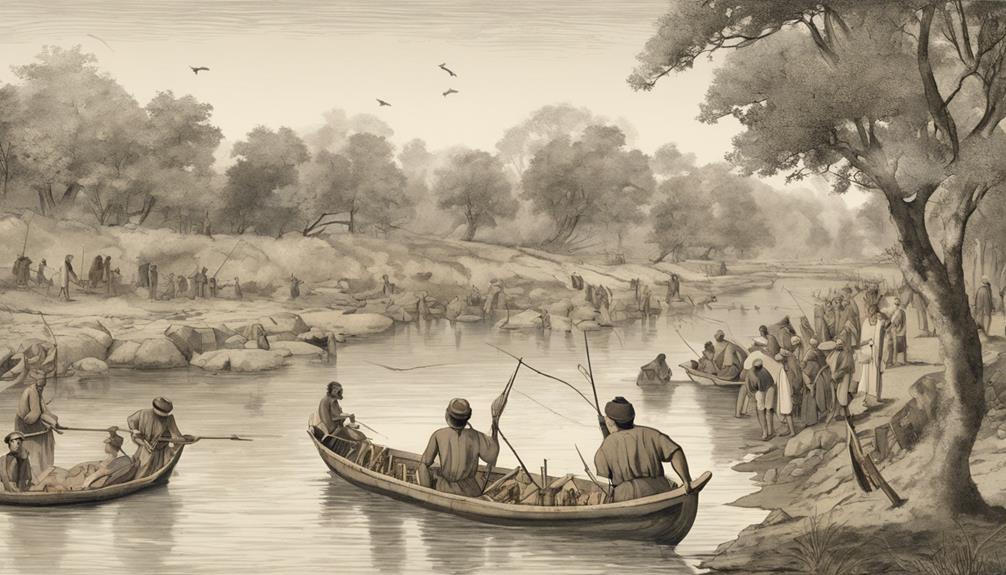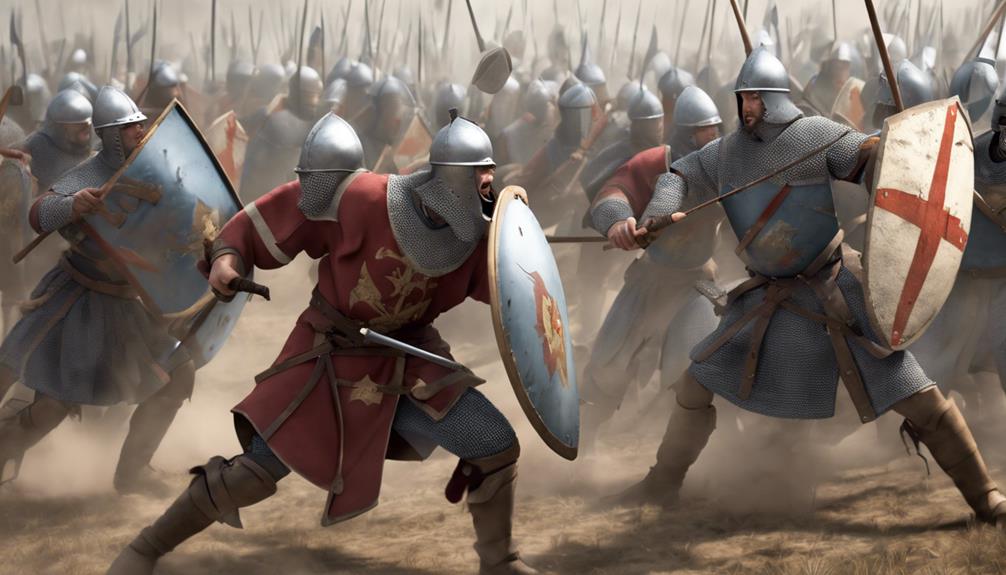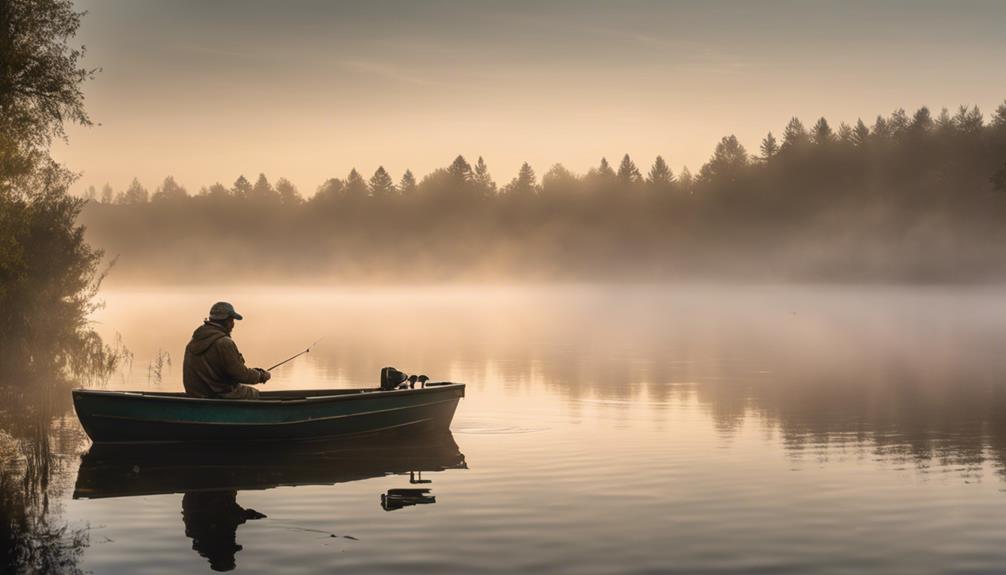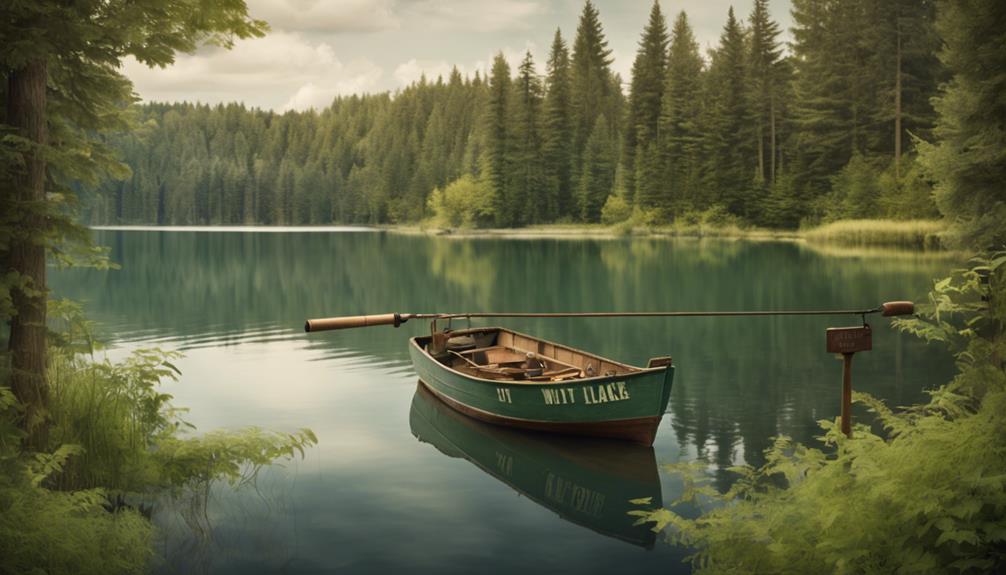Have you ever considered how a simple rod and reel could shape the course of history?
From ancient civilizations to modern societies, angling has woven itself into the fabric of our past in ways you might not expect.
As you explore the intricate connections between fishing practices and historical developments, you'll uncover a tapestry of insights that reveal the profound impact of angling on the evolution of human culture.
Economic Impact of Angling
The economic impact of angling can be seen in the revenue generated by equipment sales, travel expenses, and tourism. Angling tourism plays a significant role in boosting local economies. When anglers travel to different destinations to pursue their hobby, they not only spend money on accommodation and food but also contribute to the growth of the fishing industry in that region.
The fishing industry benefits greatly from the economic activity generated by angling. The sale of fishing equipment such as rods, reels, bait, and clothing provides a steady stream of income for manufacturers and retailers. Additionally, the demand for specialized fishing gear has led to innovation and growth within the industry, creating new job opportunities and further stimulating economic growth.
Angling tourism also supports local communities by creating jobs in hospitality, guiding services, and conservation efforts. The presence of anglers in an area can lead to the development of infrastructure such as marinas, boat ramps, and fishing lodges, which not only cater to the needs of anglers but also attract other tourists, further boosting the local economy.
Cultural Significance of Fishing Traditions
Exploring the deep-rooted cultural significance of fishing traditions reveals a rich tapestry of heritage and practices that have endured through generations. Folklore customs, rituals, indigenous practices, and beliefs are intricately woven into the fabric of fishing traditions worldwide. These traditions aren't merely about catching fish; they're about connecting with nature, honoring ancestors, and preserving cultural identities.
Fishing folklore customs and rituals vary across different regions but share common themes of respect for the natural world and gratitude for the bounty it provides. From traditional ceremonies before setting out to sea to rituals performed upon a successful catch, these practices reflect a deep spiritual connection to the environment and the creatures within it.
Indigenous fishing practices and beliefs are often deeply intertwined with cultural identity and survival. For many indigenous communities, fishing isn't just a means of sustenance but a way of life passed down through generations. The techniques, tools, and stories surrounding fishing are integral to their cultural heritage, serving as a bridge between the past, present, and future.
Evolution of Fishing Techniques
Delving into the historical development of fishing techniques reveals a dynamic evolution shaped by innovation, necessity, and environmental factors. Technological advancements have played a pivotal role in transforming fishing practices. From the rudimentary tools and methods used by early civilizations to the sophisticated gear and equipment available today, the progression has been remarkable. Innovations such as the invention of the fishing reel, sonar technology for locating fish, and the development of lightweight, durable materials for fishing rods have revolutionized the way people fish.
Sustainability practices have also become increasingly important in the evolution of fishing techniques. As societal norms shift towards conservation and environmental awareness, methods like catch and release, sustainable harvesting practices, and habitat restoration efforts have gained prominence. These practices aim to minimize the environmental impact of fishing activities and ensure the long-term health of aquatic ecosystems.
Moreover, societal norms have influenced the evolution of fishing techniques. Traditional fishing practices passed down through generations have shaped the way communities approach fishing. Cultural beliefs, customs, and rituals related to fishing have influenced the development of specific techniques used in different regions around the world. By adapting and innovating based on societal needs and environmental considerations, fishing techniques continue to evolve, reflecting the dynamic relationship between humans and the aquatic environment.
Influence on Art and Literature
Uncover how angling has influenced various forms of art and literature throughout history. Fishing, with its serene and contemplative nature, has often been used as a symbol in art and literature. The act of casting a line and waiting patiently for a catch has been explored as a metaphor for life's uncertainties and the passage of time. Artists and writers have drawn inspiration from the peacefulness of fishing, using it to convey themes of patience, perseverance, and the interconnectedness of humanity with nature.
In art, angling has been depicted in various paintings and sculptures, capturing the essence of the activity and its deeper meanings. The fishing rod, the shimmering water, and the anticipation of a bite have all been explored as symbols of hope, introspection, and the quest for knowledge. Artists have used fishing scenes to evoke a sense of tranquility and reflection, inviting viewers to contemplate the deeper significance of the mundane act of fishing.
Likewise, in literature, angling has been a recurring motif in poems, novels, and short stories. Writers have employed fishing as a metaphor for the human experience, delving into themes of solitude, connection with the natural world, and the search for inner peace. By exploring symbolism and drawing artistic inspiration from angling, creators across the centuries have enriched their works with layers of meaning and emotion, inviting audiences to ponder life's complexities through the simple yet profound act of fishing.
Political Associations With Angling
Throughout history, the practice of angling has been intertwined with various political associations, reflecting its significance beyond leisure and recreation. Angling hasn't only been a pastime but has also played a role in shaping government regulations and being a part of social movements.
Government regulations often revolve around angling due to concerns about conservation and the impact of overfishing on aquatic ecosystems. Politicians and policymakers have implemented laws to manage fish populations, protect endangered species, and preserve natural habitats. Angling enthusiasts have also been involved in advocating for sustainable practices to ensure the longevity of their beloved sport.
Moreover, angling has been connected to social movements that aim to promote environmental awareness and conservation efforts. Anglers have joined forces with conservation groups to protect water bodies, promote clean water initiatives, and fight against pollution that threatens aquatic life. By participating in these movements, anglers have demonstrated their commitment to preserving the environment for future generations.
Preservation of Historical Fishing Locations
Preserving historical fishing locations is crucial for maintaining the cultural heritage and ecological significance of these sites. By engaging in environmental stewardship practices, you can help protect these areas for future generations.
Historical fishing locations often hold significant cultural value, representing traditions and practices that have been passed down through generations. Additionally, these sites play a vital role in supporting local ecosystems and biodiversity.
When you actively participate in the preservation of historical fishing locations, you contribute to the promotion of heritage tourism. Tourists are increasingly drawn to destinations with rich historical backgrounds, and preserving these fishing sites ensures that they remain attractive for visitors seeking unique cultural experiences. By safeguarding these locations, you not only protect their historical integrity but also create opportunities for economic growth through tourism.
Moreover, your efforts in preserving historical fishing locations can inspire others to engage in similar environmental stewardship activities. By setting an example of responsible conservation practices, you contribute to a collective effort in safeguarding our natural and cultural heritage. Remember, every action you take towards preserving these sites has a ripple effect, influencing the broader community to value and protect these invaluable resources.
Role of Angling in Community Development
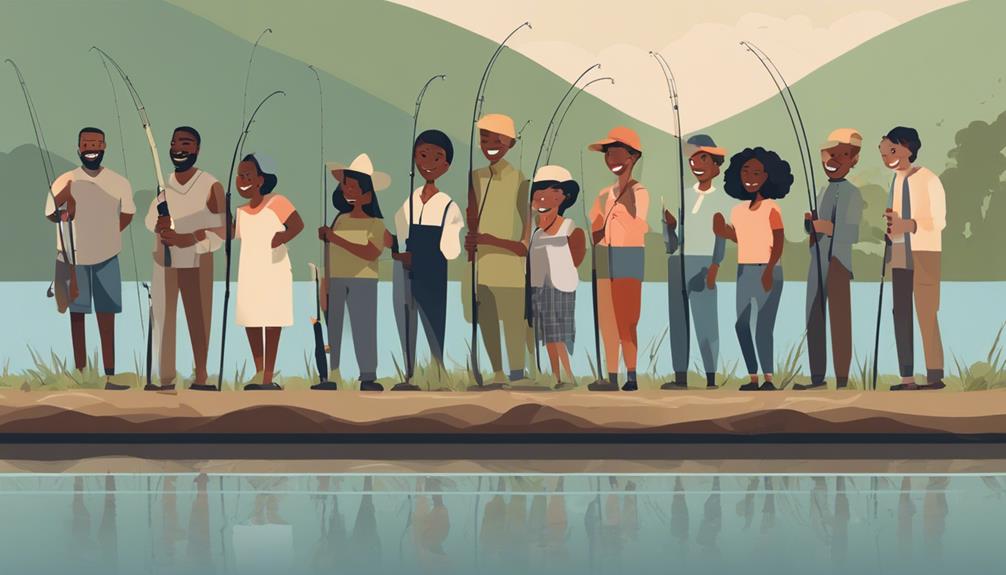
Angling plays a pivotal role in fostering community development by fostering connections, promoting outdoor recreation, and supporting local economies. Here's how angling contributes to community development:
- Community Bonding: Angling brings people together from different backgrounds and ages, creating opportunities for meaningful interactions and relationships. Whether it's families spending quality time together by the water or local fishing clubs organizing events, angling strengthens the bond within the community.
- Social Cohesion: Through shared experiences and a common interest in fishing, anglers develop a sense of belonging and unity. This shared passion for angling transcends societal barriers and encourages collaboration, understanding, and mutual respect among community members.
- Promoting Outdoor Recreation: Angling encourages people to spend time outdoors, connecting with nature and enjoying the benefits of fresh air and physical activity. This not only improves individual well-being but also contributes to a healthier and more active community as a whole.
- Supporting Local Economies: Angling can boost local economies by attracting tourists, creating job opportunities in the fishing industry, and supporting businesses that cater to anglers. From bait and tackle shops to bed and breakfasts near fishing hotspots, angling stimulates economic growth and vitality in communities.
Angling's Contribution to Conservation Efforts
As we shift our focus to conservation efforts, it becomes evident that angling's impact extends beyond community development, playing a crucial role in preserving natural habitats and wildlife populations. Angling contributes significantly to wildlife protection by promoting sustainable practices and habitat restoration.
Through catch-and-release programs and adherence to fishing regulations, anglers actively participate in conserving fish populations and ensuring their long-term viability. By practicing responsible angling, you directly contribute to maintaining a balanced ecosystem and safeguarding various species from overexploitation.
Additionally, anglers often engage in habitat restoration projects, such as cleaning up waterways and planting vegetation along riverbanks. These efforts not only benefit fish populations but also support other wildlife that depend on healthy aquatic ecosystems for survival.
Moreover, angling serves as a platform for environmental education. By spending time outdoors and interacting with nature, anglers develop a deeper appreciation for the environment and become more conscious of the need for conservation. This awareness can lead to advocacy for policies that protect natural habitats and wildlife, creating a ripple effect that extends beyond the angling community.
Frequently Asked Questions
How Has Angling Influenced the Development of Fishing Technology Over Time?
When it comes to angling, you'll see evolutionary advancements and technological innovations shaping fishing technology over time. Angling has driven the development of tools and techniques used in fishing.
From simple hooks and lines to sophisticated reels and sonar devices, angling constantly pushes for improvements. As anglers strive to catch more efficiently and effectively, the evolution of fishing technology continues to progress, influenced by the art and science of angling.
Are There Any Famous Historical Figures Who Were Known for Their Passion for Angling?
When it comes to famous anglers and historical figures, there are indeed notable individuals known for their passion for angling. These figures not only excelled in their pursuits of fishing but also had a significant cultural impact through their love for the sport.
Their dedication to angling not only shaped their personal lives but also left a lasting legacy that inspired others to take up the art of fishing.
How Has the Political Landscape Been Shaped by the Practice of Angling Throughout History?
Throughout history, angling has had a significant impact on the political landscape and societal changes. The practice of angling has influenced political decisions, as it served as a means of diplomacy and building alliances. Additionally, angling has brought about societal changes by creating opportunities for social gatherings and fostering a sense of community among individuals with shared interests.
The political influence of angling has played a crucial role in shaping historical societies.
What Role Do Historical Fishing Locations Play in the Preservation of Cultural Heritage?
When it comes to preserving cultural heritage, historical fishing locations hold a significant role. These sites not only showcase the traditions and practices of past societies but also provide insights into the development of angling technology over time.
How Has Angling Impacted the Representation of Nature in Art and Literature Throughout Different Historical Periods?
When it comes to art and literature, angling has had a profound impact on how nature is represented. Through the lens of angling, artists and writers have captured the beauty and tranquility of natural landscapes, influencing the way we perceive and interpret the environment.
This connection between angling and creative expression hasn't only shaped cultural representations of nature but also contributed to societal awareness about environmental conservation.
Conclusion
In conclusion, angling has played a significant role in shaping historical societies through its economic impact, cultural significance, evolution of techniques, influence on art and literature, political associations, preservation of locations, community development, and contributions to conservation efforts.
Its influence can be seen in various aspects of society, highlighting the importance of fishing traditions and the interconnectedness between angling and the development of communities throughout history.
Angling continues to be a cherished pastime that connects people to nature and their heritage.
